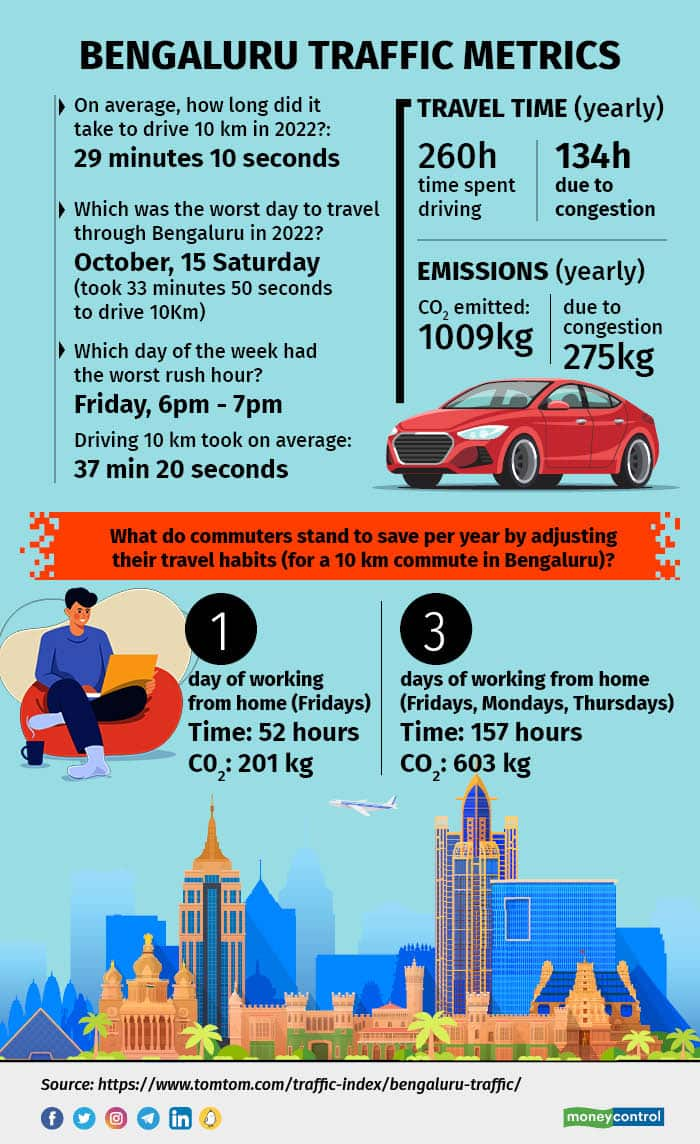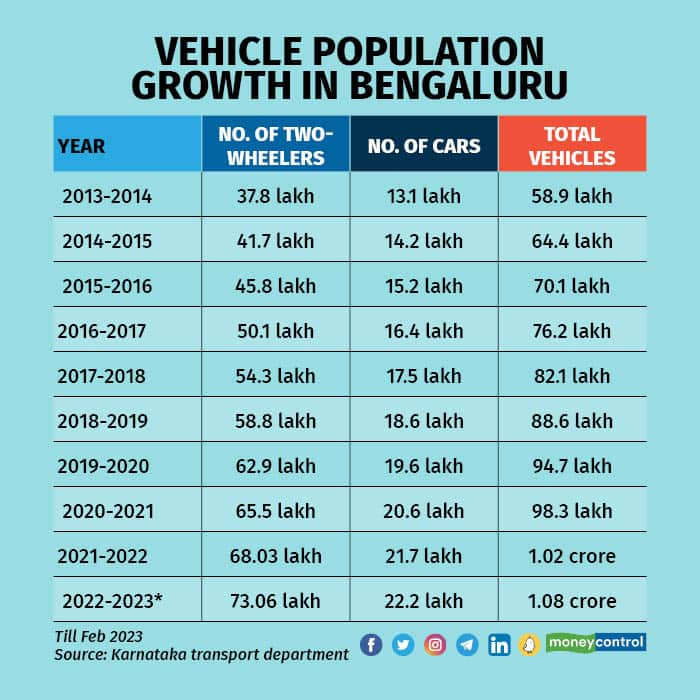



In the country’s tech capital, an average of 775 vehicles jostle for road space every km, according to the transport department’s latest records.
The city’s road network, spanning 14,000 km (of which major road networks comprise less than 20 percent), had a total vehicle population of 1.08 crore until February this year.
Of the total vehicles registered in the city, two-wheelers constitute the maximum number with 73.06 lakh (density: 521 per km), followed by 22.2 lakh cars (158 per km). In addition to this, vehicles registered in other districts and states are also plying on city roads.
A traffic index published by Dutch location technology specialist TomTom in February this year stated that Bengaluru was the second-most congested city in the globe during 2022. The report mentioned that it took an average of 29 minutes and 10 seconds for commuters to cover a 10km stretch in the city centre last year. The average speed during peak hour in the central business district (CBD) was 18kmph.

In 2013-2014, Bengaluru had only 58.9 lakh vehicles including 37.8 lakh two-wheelers and 13.1 lakh cars. This means the vehicle population in the city has increased by 59 percent, car numbers have gone up by 51 percent and two-wheelers have risen by 63% during the same period (2013-2014 and 2022-2023).
State transport commissioner SN Siddaramappa told Moneycontrol, that Covid-19 only worsened matters. "During Covid-19 when vehicular movement was restricted and public transport users were scant, there was a significant jump in the number of people buying their own cars and two-wheelers. Now, using private vehicles for regular commute has turned into a habit. Bengaluru is a huge market for two-wheelers, especially because they're easier to navigate through traffic.”

Pointing out that the average speed during peak hours has improved in the last three months due to the restriction of heavy/good vehicles, special commissioner of police (traffic) MA Saleem told Moneycontrol that his department is deploying additional staff to regulate traffic. “Ultimately, public transport will have to be strengthened to reduce traffic jams. There is likely to be some relief once Metro services to Electronics City and Whitefield are operational.”
"It's not necessary that all registered vehicles will be on roads,” Ashish Verma, professor, transportation systems engineering, Indian Institute of Science (IISc) points out. “In our survey, we found that of the total 5,81,17237 sqm total carriage way in the city, cars occupy 13.2 lakh sqm area during peak hours, 8.7 lakh sqm by two-wheelers and 1.7 lakh sqm by buses. Total area occupied by three modes during peak hour is 23.8 lakh sqm,” he added.

A car, Verma explains, takes up 38 times more space to carry one passenger, than a bus, during peak hours. “The city is adding 1,500 new cars per day. This when just a few thousand more buses can majorly strengthen public transport.”
Infra projects on slow track
Currently, Bengaluru Metropolitan Transport Corporation (BMTC) and Bangalore Metro Rail Corporation Limited (BMRCL) are providing transport services in the city. BMTC has only around 6,800 buses when it should have around 12,000 buses to meet the city’s demands. Namma Metro is operational only for 56 km and is yet to connect tech corridors like Outer Ring Road, Electronics City, Hebbal and Whitefield. The 148-km Bengaluru suburban rail project, conceptualised to ease congestion, remains on the drawing board. Projects like the 78 km Peripheral Ring Road which is proposed on the northwest periphery of the city with complementary connectivity to NICE Road on the southeast periphery are also yet to take off.
What state government's CMP states
The Comprehensive Mobility Plan (CMP) for Bengaluru, prepared by the Karnataka government in 2020 reads: “The key findings of all the surveys indicate that all roads within the Outer Ring Road boundary are facing severe congestion during the peak hours leading to gridlocks. One of the primary reasons for traffic congestion is the low capacity of Bengaluru roads that are facing the brunt of the ever-bludgeoning traffic growth.”
“Even the smaller roads intersecting the main arteries are congested leading to large delays at intersections, reducing the speeds significantly. With on street parking being rampant and haphazard, there is a severe reduction in the available road capacity for vehicular movement including High Density Corridors in the city,” it said.
The report notes that junctions like Central Silk Board, KR Puram and Hebbal have more than three lakh vehicles per day. “It is observed that the speeds on the city road network are mostly less than 20 kmph while the core area of Bangalore operates at very low speeds (less than 11 kmph) in the peak hour," it adds.
Discover the latest Business News, Sensex, and Nifty updates. Obtain Personal Finance insights, tax queries, and expert opinions on Moneycontrol or download the Moneycontrol App to stay updated!
Find the best of Al News in one place, specially curated for you every weekend.
Stay on top of the latest tech trends and biggest startup news.